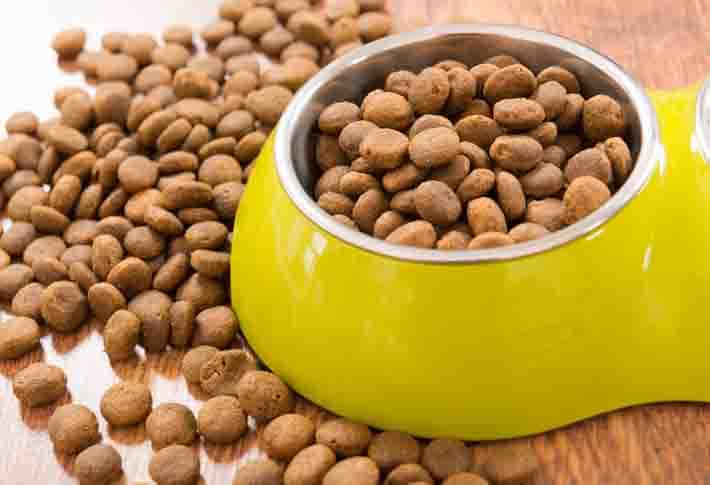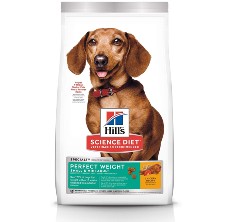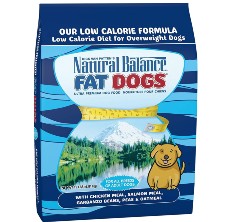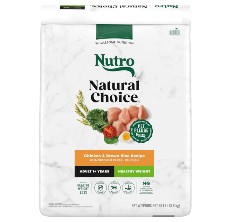- Home
- Gear Categories

Fight Canine Obesity with The Leading Weight Loss Dog Food
Written by Jarett Gilpin
Last updated: Oct 23, 2024, 05:38 AM
Affiliate disclosure (read)

Our Top Picks for the Weight Loss Dog Food of 2024
- Hill’s Science Diet Dry Food: Editor’s Choice (shop now)Read more about this ↓
- Natural Balance Low-Calorie Dog Food: Runner Up (shop now)Read more about this ↓
- Purina ONE Healthy Dog Food: For Overweight Dogs (shop now)Read more about this ↓
- Purina Pro Plan Diet Dog Food: Great for Digestive Health (shop now)Read more about this ↓
- Nutro Healthy Adult Dog Food: Non-GMO (shop now)Read more about this ↓
Hill’s Science Diet Dry Food
Editor’s ChoiceThe Hill’s Science diet food for adult dogs claims to show promising results in just under 10 weeks of use. This is one of the veterinarians’ top recommended brands and is known for the immense health benefits it offers to all breeds and sizes of dogs. This dry food will support life-long weight management for your dog.
It helps with strengthening and maintaining lean muscle in your dog, especially in small-sized dogs. Every batch goes through rigorous, state-of-the-art testing and tracking to make sure it’s packed with quality nutrients. It comes with a carefully curated feeding guide based on the size of your dog that you must follow for the best results.
Pros
- All-natural ingredients
- Quality tested and tracked
- Clinically proven results
Cons
- Very small pellet size
Natural Balance Low-Calorie Dog Food
Runner UpDelicious, satisfying, and healthy, the Natural Balance dog food is a combination of carefully picked ingredients to let your dog lead an active life. The formula is curated by food science experts who’ve made sure that your dog isn’t deprived of essential nutrients and healthy fats on the journey to lose a little weight.
Moreover, it comes with a special protein and fiber blend that helps your pup feel full for a longer time. The formula includes targeted levels of L-carnitine that is necessary to maintain a healthy weight and body mass. There are wholesome grains for increased fiber content, and the added zinc and vitamins aid in creating a strong immune system.
Pros
- Zinc, vitamin E & C to support immune health
- Chicken, salmon, and barley for taste
- Low-calorie yet fulfilling
Cons
- Kibble size and texture might seem difficult to chew for older dogs
Purina ONE Healthy Dog Food
For Overweight DogsThis dry dog food by Purina ONE brings you a specially tailored formula for the unique needs of an overweight dog. It has been designed to target adult dogs to help them maintain a healthy weight. The high protein concentration in the food formula supports lean muscle formation and maintenance, while high-quality protein and fiber promote fullness and long-lasting satisfaction.
The heart-healthy nutrients make sure the dog stays active and playful while an antioxidant blend supports the immune system. Moreover, the fat and calorie content is almost 25% less than any normal dog food.
Pros
- Blended, semi-moist kibble for all kinds of dogs
- Vitamins and minerals to support a strong immune system
- All-natural sources of nutrients
Cons
- Kibbles crumble and become powdery after a while
Purina Pro Plan Diet Dog Food
Great for Digestive HealthPerfect for all kinds of dog breeds, the Purina pro plan dry dog food for weight loss comes with chicken shreds and is packed with nutrients and fiber. The rice, wholegrain, and shredded chicken blend make sure your dog’s digestive system is always healthy.
The main ingredient in this dry weight loss dog food is high-protein real chicken. To maintain and strengthen the immune system, the formula contains live probiotics that also help with digestive health. It has less fat and calorie content than any regular dog food. The probiotic fiber helps in nourishing intestinal bacteria for healthier digestive health.
Pros
- Not too hard or soft
- Contains vitamins and minerals
- Supports strong immune system
Cons
- Small kibble size for large dogs
Nutro Healthy Adult Dog Food
Non-GMOThis is the perfect brown rice and chicken recipe for your overweight dog. The formula is made with all non-GMO ingredients. It doesn’t contain any by-products of chicken or beef, wheat, corn, or soy. This dog food is a high source of protein and quite low on calories and fat content.
The tailored blend of fiber and protein makes sure your dog’s gut health is good. The essential antioxidants support a strong immune system. All ingredients included in the dog food are cooked, Each recipe is carefully crafted with a superior quality protein source such as lamb, chicken, beef, or venison meal.
Pros
- Supports joints and heart health
- Protein-rich dry formula
- Can be served slightly moistened
Cons
- May make your dog gassy
Best Weight Loss Dog Food Buying Guide
Here’s a comprehensive guide covering everything that you must know before buying dog food for weight loss.
Things to Consider Before Buying Dog Food for Losing Weight
You can find a variety of dog foods claiming and marketed to aid with weight loss, but that doesn’t necessarily mean they are a good choice for you. Here are some things you should always check:
Nutrients
Check the label for necessary minerals, vitamins, and a good amount of major macromolecules like carbohydrates, fats, proteins, and nucleic acids. A balanced amount of all these nutrients is a must for a healthy and happy pup.
Reduced calorie content
The main difference between normal dog food and weight loss dog food is the caloric content. A good weight loss food will have significantly low calories but they will provide the same amount of bulk. The bulk helps the dog feel fuller and keeps them satisfied for a long period.
Check for a good fiber content as fiber takes up plenty of space in the dog’s gut while providing a few usable calories as well. Furthermore, dog food designed for weight loss can also feature a high protein level in addition to a low fat level.
Probiotics
A good weight loss dog food will be fortified with probiotics. Probiotics are healthy bacteria that aid your dog’s intestinal tract to operate effectively. You should pick dog food with probiotics so there are lesser chances of your dog ending up with an upset stomach.
Delicious
Make sure you pick a dog food that will appeal to your dog’s palate. You wouldn’t want your dog to stop eating altogether. Make sure the food has your dog’s favorite flavors like turkey, chicken, or beef.
How Do I Know My Dog is Overweight?
It is quite possible that your dog might not show how much weight they have put on due to their fur. You will have to monitor your pet’s movements and habits to identify canine obesity. Here are some of the best and easiest ways of finding out if your dog is over the normal weight for their breed and size:
Body profile
Observe your pup’s overall body profile carefully as they move, sit or lie down. Notice how their body folds when they sit from the side, or you can simply stand above them and judge the profile. If you feel your dog has a bulge on the tummy area or they’re sitting and laying down most of the day, chances are that your dog is obese.
You can tell your dog is at a healthy weight and in good shape if you can spot a faint hourglass shape from the above and their abdomen seems slightly tucked inside.
Weight
The easiest way of figuring out if your furry friend is suffering from obesity is to check their weight. See if their weight falls into the healthy weight range for their height, size, and breed.
Feel the ribs
Another effective way is to hold your dog from the sides of the torso and gently press your hands in. If your dog is at an optimal weight, you will be able to feel their ribs without much pressure. If they are fat, you won’t be able to feel the ribcage properly due to a layer of fat that covers their body.
Tips for Buying Quality Weight Loss Dog Food
Here are some key criteria that a weight loss dog food must pass:
- Make sure you pick a food brand that manufactures in a country with high safety standards. Mostly, high-quality pet food will be made in Canada, USA, Western Europe, New Zealand, or Australia.
- The best weight loss pet food will feature a whole protein that will conspicuously be placed at the front of the pack. Select food that has deboned beef or chicken at the beginning of the ingredients list. Unquestionably, meat should form the bulk of your dog’s diet.
- Only pick identified meat products that are properly labeled on the product, such as “beef/chicken meal”. Avoid products with labels such as “meat meal”, these products often contain ingredients obtained from unsavory sources.
- Ensure it doesn’t contain meat byproducts or unidentified meat meals. Unnecessary additives and artificial colors also trigger a lot of canine allergies in older dogs. You should avoid these.
What Does Canine Obesity Do?
Gaining too much weight will affect the health of your dog eventually no matter what breed they belong to or what their lifestyle is. Here are some common problems with obese dogs:
- Overweight dogs have a high chance of developing diabetes mellitus. This can also lead to impaired kidney, nerve issues and will shorten their lifespan.
- Obese dogs can also suffer from hypertension (high blood pressure) that can end in cardiac issues later.
- It can also lead to breathing difficulties, liver problems, skin issues, and reproductive failure.
- Other common problems they may end up with are increased body temperature, joint problems, heart disease, and an overall decreased lifespan.
Conclusion
Every dog starts to put on weight at some point in their lives. You, as a pet parent, should make sure you’re keeping a check on their health and activity levels at all times. Make sure you notice their movements, eating habits, and the quality of their diet.
And, if your dog has put on some pounds, no need to worry. You can gradually switch them to a controlled weight management food system to make sure they lead a healthy life. This guide will equip you with all the knowledge you must have about the shift and some of the leading weight loss dog foods in 2023.
We independently research, test, review, and recommend the best products - learn more about our process here. If you buy something through our links, we may earn a commission.




